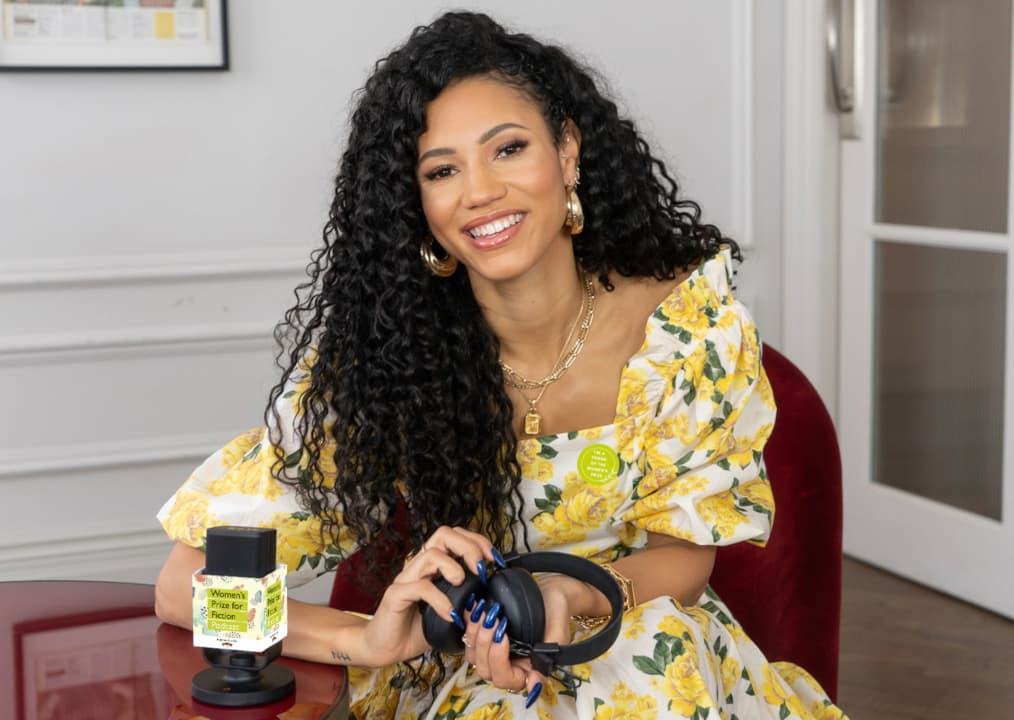

The Women’s Prize x Grazia First Chapter competition ran for 12 years and has now been discontinued, with 2022 being the last year the competition was run. We keep an archive of past winners and runners-up to inspire future writers to tell their stories. Scroll on to read the 2022 entry that stunned the judges and participating author, Tayari Jones. Feeling inspired? You can enter our Discoveries programme for emerging writers. Learn more here.
Meet Estefania Cortes Harker, a finalist in the 2022 Women’s Prize x Grazia First Chapter competition. Estefania, 35, was born in Madrid, Spain. She moved to London to pursue a career in design, joining the BA and MA courses at Central Saint Martins, before working as a shop assistant, pizza van vendor and cat sitter. She is now Design Manager at a quintessential British brand. She was recently longlisted for the Brick Lane Short Story competition, and is currently near completion on her first novel.
Tayari Jones started the chapter…
I’d lost my job at the start of the pandemic and there really wasn’t much to fill my afternoons, so you can’t blame me for day-drinking. Returning home for a nap, I found a tall woman sprawled inelegantly on the front stairs, surrounded by candy wrappers.
She didn’t recognize me. To be fair, I had changed a lot in the last twelve years; it’s called growing up. Still, having planned the encounter, she should have been prepared.
As I opened the gate, she smiled and asked if I knew a girl called Teresa.
“It’s me,” I sighed. “Mother, it’s me.”
Estefania continues the story…
She squinted, wiping a chocolate stain off her chin with the back of her hand, and staggered up, heaving her body against the banister. Her skin was an uneven map of hollowed out craters and crevices and powdered plains, framed by long, dark curls. Upright she looked shorter, but then I was taller now: children grow and grown ups shrink, and we all shake hands somewhere in the middle.
“You can’t expect me to remember all of you,” she replied, still smiling.
“We remember you,” I said, slightly hurt. Yes, I wasn’t the only one. But wasn’t I her favourite – she had told me at the time. But even then, even at the very beginning, she’d always been quick with a line and a lie.
She swatted me away with her hand. “I’ve no time to dance around you and your feelings,” she spat the word out, so alien to her that she had to expel it fast before the concept took hold and left a stain. Towards the end I’d realised there were other words she did not like: loyalty, love, mercy. To her they meant something else entirely.
“We should go inside,” I replied, “but first you should clean that shit up.” I dipped my head at the wrappers in overt disgust. “You’re a mess… Mother.” She cackled at that, and an avalanche of make-up powders crumbled from her cheek.
I made her a cup of tea. “It tastes like cardboard,” she declared, once we were sitting in my small front room. “It has no depth, no follow through – no character.” She rustled a wrapper in her pocket and produced the end of what might have once been a Twix, placing it whole on her tongue and sucking loudly.
“That’s what you get when you turn up unannounced,” I said. I still hadn’t decided how I felt about her visit. Unnerved, I thought, with a hint of something else – excitement, maybe. I swigged at a beer to blur the edges, not that I needed a reason to drink.
“You’re very sensitive. Were you always like this?” she asked, cocking her head to one side. “I can’t imagine you’d have been very popular with the others.”
She was right, I hadn’t been.
“How could I have meant so little to someone who meant so much?”
The girls and I used to sleep head to toe on Mother’s narrow bunk beds, our limbs and breaths and heartbeats entwined so tightly I couldn’t tell where I started or ended, back at the big house across the way from the Grand canal. Training would go like this: she’d wake us up with a whistle before dawn and we’d sprint into the misty fields behind the barn, straight into the morning drills. We wouldn’t even get dressed out of our nightclothes, because “death doesn’t care if you’re in pyjamas.”
She taught us to shoot by throwing fruit into the air with a hand held cannon; you started on a melon, then moved to grapefruit, lemon, clementine and grape. If you got a grape mid air she’d look back and give you a wink; if you missed a grapefruit you’d be left with no food for days. We learnt how to use knives by dancing with each other, while Mother stood by the sides eating Kit Kats and keeping time with her foot, chanting “front, front, duck and stab. And again!” We learnt how to use axes and clubs, how to slit a throat and spear a body. We learnt how to make use of random household items: 10 extra points if you could knock someone out with a banana. We learnt how to fight and claw against each other, and we’d practice until our faces were bloody and our knuckles pulped –- I lost two teeth in one afternoon and cried because I thought I’d never be pretty again. Mother told me I didn’t need to be pretty to get the job done.
Some of the girls had parents, others – like me – were orphaned by choice or circumstance: the odds and sods, the left behinds. But we’d all been picked by Mother, we’d had that in common at least. I kept something back from the other girls because we were competitive and petty, and I didn’t trust them not to scratch at my face or kick me in the shins to gain favour.
But Mother. It had always felt safer, somehow, to put my love on her. She felt more solid, more of a sure thing. Ha! What a fool.
“Do you really not remember me?” I asked her. It seemed implausible. How could I have meant so little to someone who meant so much? I wanted to cry into her skirt.
“There were too many of you” she shrugged. “No offence.” Mother still had a Spanish twang – I could hear it on the R’s, but it had softened with time. “So, Teresa. Te-Re-sa,” she said, and swirled the name around her mouth. “I like it. Better than the old one.” “How do you know I changed it, if you don’t remember me?” I counter.
She tapped the bag next to her. “It’s in the dossier, Sasha.”
Oh. “I’ve been Teresa for nearly eleven. I needed a rebrand, after everything.”
“Teresa is a good name. Holy.” Mother nodded in approval. “All the young girls now, calling themselves Pear and Moonlight and Ass-beam. Bah!” she exclaimed, slapping the arm of the sofa. “Nobody wants to be introduced into the world with an honest name anymore.”
“You’re awfully judgemental, considering you kill people for a living,” I said.
She laughed, delighted. “Oh Sasha.”
“Why are you here?” I asked. I should’ve asked before, the second I saw her, but I was in a lull – dazed by the brightness of her, even after all these years.
Mother smiled. She opened her bag, pulled out an envelope and held it towards me.
“No,” I said, slapping her hand away. “I don’t want it.”
“Aren’t you a doll,” she replied, “to think you have a choice.”
To read the chapter as completed by finalist Emma Zipfel click here, or to meet the 2022 First Chapter winner Carmel Boyhan Irvine, click here.
Tune into host Vick Hope and a line-up of incredible guests on our weekly podcast full of unmissable book recommendations.
